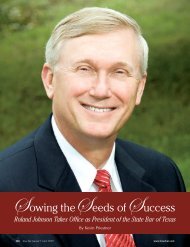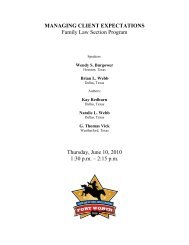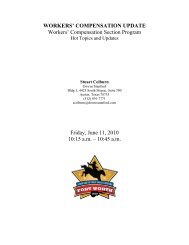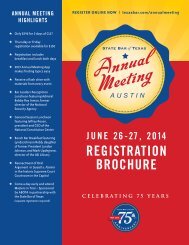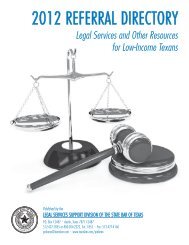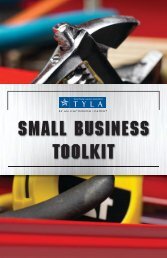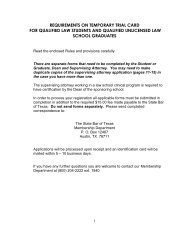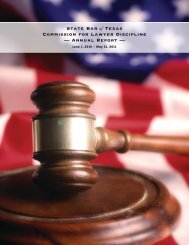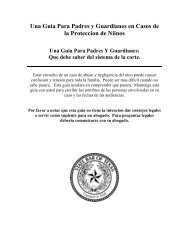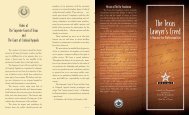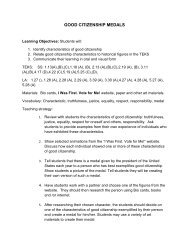Ethically Navigating the Social Media Landscape - State Bar of Texas
Ethically Navigating the Social Media Landscape - State Bar of Texas
Ethically Navigating the Social Media Landscape - State Bar of Texas
You also want an ePaper? Increase the reach of your titles
YUMPU automatically turns print PDFs into web optimized ePapers that Google loves.
BY DEBRA BRUCEore and more lawyers are recognizing <strong>the</strong> benefits to <strong>the</strong>ir legal practice <strong>of</strong> embracing socialmedia. As with <strong>the</strong> early days <strong>of</strong> email and <strong>the</strong> Internet, however, many attorneys are confusedand concerned about ethical implications. Beyond <strong>the</strong> usual concerns about inadvertentlyestablishing an inappropriate attorney-client relationship or giving advice without adequateinformation, online media can involve ethical risks that might not be readily apparent.This article will attempt to bring some clarity by answering common questions and warningabout <strong>the</strong> danger zones lawyers must navigate. The term “social media”encompasses many different applications, but this article willfocus primarily on five social media sites frequentlyused by <strong>Texas</strong> lawyers: Facebook,LinkedIn, Twitter, YouTube,and <strong>Texas</strong> <strong>Bar</strong> Circle.196 <strong>Texas</strong> <strong>Bar</strong> Journal • March 2010 www.texasbar.com
<strong>Ethically</strong> <strong>Navigating</strong> <strong>the</strong><strong>Social</strong> <strong>Media</strong> <strong>Landscape</strong>BRUCEIS A FACEBOOK OR LINKEDIN PROFILE REQUIREDTO BE FILED WITH THE STATE BAR ADVERTISINGREVIEW COMMITTEE?<strong>Texas</strong> Disciplinary Rule <strong>of</strong> Pr<strong>of</strong>essional Conduct 7.07addresses <strong>the</strong> filing requirements for public advertisementsand written, recorded, electronic, or o<strong>the</strong>r digital solicitations.Rule 7.07(c) requires a lawyer’s website to be filed, unless it islimited to certain exempt information enumerated in Rule7.07(e). Sometimes called a “tombstone” ad, <strong>the</strong> exemptionsinclude contact information, dates <strong>of</strong> admission to <strong>the</strong> bar,areas <strong>of</strong> practice, acceptance <strong>of</strong> credit cards, languages spoken,and o<strong>the</strong>r specified information. Interpretive Comment 17adopted by <strong>the</strong> Advertising Review Committee also clarifiesthat “a lawyer or law firm’s listing on a web-based directory thatis accessible by <strong>the</strong> public shall be exempt from <strong>the</strong> filingrequirements <strong>of</strong> Rule 7.07 if it meets <strong>the</strong> requirements <strong>of</strong>7.07(e)(1).”Clearly, a social media pr<strong>of</strong>ile containing only <strong>the</strong> 7.07(e)exempt information does not need to be filed. Facebook,LinkedIn, and <strong>Texas</strong> <strong>Bar</strong> Circle request educational history,however, and LinkedIn also requests employment history.Those categories are not specifically exempted pursuant to7.07(e). Lawyers could choose not to include that informationin <strong>the</strong>ir pr<strong>of</strong>iles, but <strong>the</strong>y would lose much <strong>of</strong> <strong>the</strong> value providedby LinkedIn and Facebook. <strong>Social</strong> media sites use that informationto suggest people you may know and want to connectto or “friend.” Additionally, your former classmates and colleaguesuse that information to find you or to distinguish yourpr<strong>of</strong>ile from that <strong>of</strong> someone with a similar name.Gene Major, director <strong>of</strong> <strong>the</strong> <strong>State</strong> <strong>Bar</strong> Advertising ReviewDepartment, provides some reassurance. In a Jan. 19 interview,he affirmed that “<strong>the</strong> Advertising Review Committee and <strong>the</strong>Advertising Review Department have supported <strong>the</strong> use <strong>of</strong> newtechnology by <strong>Texas</strong> lawyers.” Major asserts that attorneys caninclude <strong>the</strong>ir true and factual educational background in <strong>the</strong>irsocial media pr<strong>of</strong>iles without triggering a filing requirement.He points to <strong>the</strong> language in authoritative Comment 8 to Rule7.02. The comment states that Rule 7.02’s prohibitions againstfalse or misleading communications do not prohibit communicationsabout various listed topics (some <strong>of</strong> which are not containedin <strong>the</strong> 7.07(e) list), “and o<strong>the</strong>r truthful information thatmight invite <strong>the</strong> attention <strong>of</strong> those seeking legal assistance.” Hereads 7.02 and 7.07 toge<strong>the</strong>r to discern <strong>the</strong> intent <strong>of</strong> <strong>the</strong> advertisingrules.www.texasbar.com/tbj Vol. 73, No. 3 • <strong>Texas</strong> <strong>Bar</strong> Journal 197
The Attorneyand <strong>Social</strong> <strong>Media</strong>The authoritative comments to <strong>the</strong> disciplinary rules includeo<strong>the</strong>r indications that <strong>the</strong> advertising rules were not intendedto regulate <strong>the</strong> kind <strong>of</strong> ordinary information included in asocial media pr<strong>of</strong>ile. Rule 7.04 sets forth requirements relatingto advertisements. Comment 6 to Rule 7.04 references basicfactual information about a lawyer found in a tombstone adand asserts that “<strong>the</strong> content <strong>of</strong> such advertisements is not <strong>the</strong>kind <strong>of</strong> information intended to be regulated by Rule 7.04(b).”Probably <strong>the</strong> greatest comfort lies in authoritative Comment6 to Rule 7.07. It reminds us that “communications need notbe filed at all if <strong>the</strong>y were not prepared to secure paid pr<strong>of</strong>essionalemployment.” Using social media to build and enhancerelationships and to engage in discussions about topics <strong>of</strong> interestcan be distinguished from advertisement or solicitation. Adifferent conclusion would be reached, however, if a lawyer’spr<strong>of</strong>ile said, “Call me if you have been injured,” and set forthprior successes. Those factors would indicate a solicitation forpr<strong>of</strong>essional employment that had <strong>the</strong> potential to be misleading,and, <strong>the</strong>refore, would be subject to regulation.If you still aren’t comfortable, go ahead and file your pr<strong>of</strong>ilewith <strong>the</strong> Advertising Review Department. They report that<strong>the</strong>y have received filings <strong>of</strong> LinkedIn pr<strong>of</strong>iles from a fewlawyers. Under Rule 7.07(d), if a lawyer submits an advertisementor a solicitation communication for pre-approval, a finding<strong>of</strong> compliance is binding in <strong>the</strong> lawyer’s favor.HOW DOES TEXAS BAR CIRCLEDIFFER FROM FACEBOOK AND LINKEDIN?In contrast with o<strong>the</strong>r social media, <strong>Texas</strong> <strong>Bar</strong> Circle isrestricted to members <strong>of</strong> <strong>the</strong> <strong>State</strong> <strong>Bar</strong> <strong>of</strong> <strong>Texas</strong>. Rule 7.04(a)(3)permits lawyers to distribute to o<strong>the</strong>r lawyers and publish inlegal directories and legal newspapers (whe<strong>the</strong>r written or electronic)<strong>the</strong>ir availability and o<strong>the</strong>r information traditionallyincluded in such publications. Therefore, lawyers have morelatitude on <strong>Texas</strong> <strong>Bar</strong> Circle than on o<strong>the</strong>r social media.WHAT IF MY BLOG APPEARS AS PART OF MYSOCIAL MEDIA PROFILE? WOULD THAT TRIGGERA FILING REQUIREMENT?Blogs usually consist <strong>of</strong> commentary or educational information,ra<strong>the</strong>r than advertisements and solicitations; <strong>the</strong>refore<strong>the</strong>y would not trigger a filing requirement. Comment 6 toRule 7.07 references <strong>the</strong> intention <strong>of</strong> <strong>the</strong> advertising rules to“protect <strong>the</strong> first amendment rights <strong>of</strong> lawyers while ensuring<strong>the</strong> right <strong>of</strong> <strong>the</strong> public to be free from misleading advertisingand <strong>the</strong> right <strong>of</strong> <strong>the</strong> <strong>Texas</strong> legal pr<strong>of</strong>ession to maintain itsintegrity.” Comment 1 to Rule 7.02 clarifies that <strong>the</strong> rules “arenot intended to affect o<strong>the</strong>r forms <strong>of</strong> speech by lawyers, such aspolitical advertisements or political commentary.”Major says attorneys are not necessarily using blogs to promote<strong>the</strong>mselves. Instead, blogs have become a useful form <strong>of</strong>communication for attorneys to get information out aboutsubject matter or events relating to <strong>the</strong>ir area <strong>of</strong> practice.“Attorneys who use blogs effectively are using <strong>the</strong>m to communicateinformation that is ei<strong>the</strong>r editorial or informational in itsnature and its tone,” he says. “That sort <strong>of</strong> blog, as long as it’seditorial or informative or educational, would be exempt fromfiling requirements.” Major cautions, however, that exemptionfrom filing does not mean exemption from <strong>the</strong> prohibitionsagainst false, misleading, or deceptive communications.ARE THERE ANY PROBLEMS WITH THE“RECOMMENDATIONS” FEATURE OF LINKEDIN?Some states prohibit <strong>the</strong> use <strong>of</strong> testimonials, but <strong>Texas</strong> doesnot. On LinkedIn, one can prescreen recommendations (evenunsolicited and unexpected ones) before <strong>the</strong>y get posted for publicview. Make sure <strong>the</strong> recommendation content complies with<strong>the</strong> disciplinary rules, however. For example, Rule 7.02(4) prohibitscomparisons to o<strong>the</strong>r lawyers’ services, unless substantiatedby verifiable objective data. Therefore, if your client enthusiasticallyreports that you are “<strong>the</strong> best trial lawyer in town,” you willneed to diplomatically ask for a revision before publication.Lawyers would be well-advised to avoid making reciprocal recommendationswhere <strong>the</strong> lawyer agrees to post a recommendationin exchange for receiving one. Rule 7.03(b) prohibits givinganything <strong>of</strong> value to a non-lawyer for soliciting prospective clients.WHAT ABOUT DESIGNATING SPECIALTIESOR BEING VOTED AS AN EXPERT ON LINKEDIN?A LinkedIn pr<strong>of</strong>ile has a field for “specialties.” Unless youare board certified by <strong>the</strong> <strong>Texas</strong> Board <strong>of</strong> Legal Specialization,you should leave it blank. Rule 7.04(b)(2) prohibits a statementin an advertisement that a lawyer has been designated byan organization as possessing special competence, unless <strong>the</strong>organization meets <strong>the</strong> requirements <strong>of</strong> that rule, whichLinkedIn does not.The area accessed through <strong>the</strong> “Answers” button in <strong>the</strong>LinkedIn toolbar can also pose problems. You can ask questionsin various categories or respond to <strong>the</strong>m <strong>the</strong>re. The readersvote on <strong>the</strong> best responses posted. When you accrue anumber <strong>of</strong> best response votes, LinkedIn automatically designatesyou an “Expert” in that category. Such expert designationwithout board certification contravenes Rule 7.04(b)(2) in anadvertisement. Although your LinkedIn pr<strong>of</strong>ile may not bedeemed an advertisement, <strong>the</strong> prudent course would be toavoid answering questions in <strong>the</strong> Answers section.You can, however, demonstrate your knowledge and buildrelationships by answering questions in LinkedIn discussiongroups that you join. There is not an Expert designation or“best answer” feature in <strong>the</strong> discussion groups.WHAT ETHICAL MISTAKES DO LAWYERS SOME-TIMES MAKE ON SOCIAL MEDIA SITES SUCH ASTWITTER AND FACEBOOK?Solicitation by Regulated Electronic ContactInteractivity constitutes a defining element <strong>of</strong> all socialmedia. Twitter, however, has such open conversation and rapidresponse time that a lawyer must keep Rule 7.03(a) in mind.198 <strong>Texas</strong> <strong>Bar</strong> Journal • March 2010 www.texasbar.com
<strong>Ethically</strong> <strong>Navigating</strong> <strong>the</strong><strong>Social</strong> <strong>Media</strong> <strong>Landscape</strong>BRUCEIt forbids using “regulated telephone or o<strong>the</strong>r electronic contact”to solicit business arising out <strong>of</strong> a particular occurrence orevent from someone who hasn’t sought <strong>the</strong> lawyer’s advice.Rule 7.03(f) defines “regulated electronic contact” to includeelectronic communication initiated in a “live, interactive manner.”Comment 1 to Rule 7.03 specifically references chatrooms, and both Facebook and Twitter sometimes resemblechat room conversation.For example, when someone Tweeted that she just got aDUI, a lawyer responded to her: “If you are looking for a DUIlawyer, I can give you my Twitter big break on fees … emailme.” Unless <strong>the</strong> lawyer already had <strong>the</strong> requisite prior relationshipwith <strong>the</strong> Twitterer, I believe that contact would violateRule 7.03 for a <strong>Texas</strong> lawyer.On ano<strong>the</strong>r occasion, a different person Tweeted, “Just got out<strong>of</strong> <strong>the</strong> Cobb County jail. Anyone know a good inexpensive DUIlawyer?” I believe <strong>the</strong> foregoing response to this Tweet wouldnot violate Rule 7.03 because <strong>the</strong> Twitterer asked for a lawyer.Breaching Client ConfidentialityThe casual nature <strong>of</strong> social media can lure attorneys to unintentionallybreach client confidentiality. A lawyer wrote in aAD REVIEW COMMITTEE ADOPTS INTERPRETIVE COMMENTTo assist lawyers advertising in <strong>the</strong> public media or solicitingprospective clients, <strong>the</strong> Advertising Review Committee hasadopted <strong>the</strong> use <strong>of</strong> Interpretive Comments. The Interpretive Commentsare designed to establish objective means for staff membersto review advertisements or solicitation communications to determineif <strong>the</strong>y comply with Part VII <strong>of</strong> <strong>the</strong> <strong>Texas</strong> Disciplinary Rules <strong>of</strong>Pr<strong>of</strong>essional Conduct. (Dates in paren<strong>the</strong>ses indicate date <strong>of</strong> originalpublication in <strong>the</strong> <strong>Texas</strong> <strong>Bar</strong> Journal.)17. The Internet and Similar Services Including HomePages (March 1996, revised May 2003, revisedMarch 2010)An advertisement or solicitation communication remains subjectto <strong>the</strong> rules regardless <strong>of</strong> <strong>the</strong> media used. Thus, Part VII <strong>of</strong> <strong>the</strong><strong>Texas</strong> Disciplinary Rules <strong>of</strong> Pr<strong>of</strong>essional Conduct applies to informationdisseminated digitally via <strong>the</strong> Internet — whe<strong>the</strong>r bywebsite, social media site, blog, or any o<strong>the</strong>r form <strong>of</strong> digitalmedia. If <strong>the</strong> contents <strong>of</strong> any such communication: (1) address<strong>the</strong> qualifications or <strong>the</strong> services <strong>of</strong> any lawyer or firm; (2) arenot exempt under Rule 7.07(e) and; (3) are generally availableto <strong>the</strong> public, <strong>the</strong> communicating attorney must file <strong>the</strong> electroniccommunication with <strong>the</strong> Advertising Review Committee.A. Websites:Of <strong>the</strong> pages <strong>of</strong> a website subject to <strong>the</strong>se rules, manymay be accessible without use <strong>of</strong> <strong>the</strong> site’s own navigationaltools. Of those pages, for <strong>the</strong> purpose <strong>of</strong> this InterpretativeComment, <strong>the</strong> “intended initial access page” is<strong>the</strong> page <strong>of</strong> <strong>the</strong> file on which navigational tools are displayedor, in <strong>the</strong> case that navigational tools are displayedon several pages, <strong>the</strong> page which provides <strong>the</strong> most comprehensiveindex capability on <strong>the</strong> site.The intended initial access page <strong>of</strong> a lawyer or law firm’swebsite shall include:1) <strong>the</strong> name <strong>of</strong> <strong>the</strong> lawyer or law firm responsible for<strong>the</strong> content <strong>of</strong> <strong>the</strong> site2) if areas <strong>of</strong> law are advertised or claims <strong>of</strong> specialcompetence are made on <strong>the</strong> intended initialaccess page or elsewhere on <strong>the</strong> site, a conspicuouslydisplayed disclaimer regarding such claims in<strong>the</strong> language prescribed at Rule 7.04(b); and3) <strong>the</strong> geographic location (city or town) in which <strong>the</strong>lawyer or law firm’s principal <strong>of</strong>fice is located. Publication<strong>of</strong> a link to a separate page bearing <strong>the</strong>required disclaimer or information required by Rule7.04(b) does not satisfy this requirement.B. Web-Based Display/Banner Ads.The content <strong>of</strong> a web-based display or banner ad,whe<strong>the</strong>r viewed independently or in conjunction with <strong>the</strong>page or pages reached by a viewer through links <strong>of</strong>feredby <strong>the</strong> ad (“target page”), will be viewed in conjunctionwith <strong>the</strong> target page.C. Web-Based Directories.A lawyer or law firm’s listing on a web-based directorythat is accessible by <strong>the</strong> public shall be exempt from <strong>the</strong>filing requirements <strong>of</strong> Rule 7.07 if it meets <strong>the</strong> requirements<strong>of</strong> 7.07(e).D. Internet Domain Names.Rule 7.01 prohibits lawyers and law firms from advertisingor practicing under a trade name or a name that is falseand misleading. Therefore, an Internet domain name orURL may not be used as <strong>the</strong> name under which a lawyeror firm does business. A domain name that is a reasonablevariation <strong>of</strong> <strong>the</strong> law firm name as permitted under Rule7.01 or that is a description <strong>of</strong> <strong>the</strong> lawyer or law firm maybe used as a locater or electronic address only if such usedoes not violate <strong>the</strong> provisions <strong>of</strong> 7.02.E. Records Retention.A printed copy <strong>of</strong> <strong>the</strong> electronic communication including,where applicable, <strong>the</strong> intended initial access page, pr<strong>of</strong>ilepage, web-based display/banner ads and/or target age aresubject to <strong>the</strong> retention requirements <strong>of</strong> Rule 7.04(f).F. Filing Requirements.Electronic communications described in this interpretativecomment are advertisements in <strong>the</strong> public media subjectto <strong>the</strong> filing requirements <strong>of</strong> Rule 7.07 unless exempt <strong>the</strong>reunder. It is <strong>the</strong> responsibility <strong>of</strong> <strong>the</strong> communicating attorneyor law firm to demonstrate that any particular onlinecommunication need not be filed with <strong>the</strong> Committee.G. Compliance.Regardless <strong>of</strong> <strong>the</strong> form <strong>of</strong> <strong>the</strong> electronic communicationdescribed in this Interpretive Comment, <strong>the</strong> content,including words, sounds and images, shall conform to <strong>the</strong>requirements <strong>of</strong> Part VII <strong>of</strong> <strong>the</strong> TDRPC.Look for <strong>the</strong> upcoming <strong>State</strong> <strong>Bar</strong> <strong>of</strong> <strong>Texas</strong> Advertising Review social media sites and blog.www.texasbar.com/tbj Vol. 73, No. 3 • <strong>Texas</strong> <strong>Bar</strong> Journal 199
The Attorneyand <strong>Social</strong> <strong>Media</strong>Tweet, “Just talked to my client who totally lied to me about all<strong>the</strong> facts.” Since <strong>the</strong> date and time <strong>of</strong> <strong>the</strong> Tweet gets posted, ithas <strong>the</strong> potential <strong>of</strong> revealing information to someone whoknew who was meeting with <strong>the</strong> lawyer that day.Ex Parte CommunicationsAccording to a public reprimand accessible athttp://www.aoc.state.nc.us/www/public/coa/jsc/publicreprimands/jsc08-234.pdf, a North Carolina judge engaged inunethical Facebook activity relating to a case being tried beforehim. During a child custody case, District Judge B. CarltonTerry, Jr. friended defense counsel, and each <strong>of</strong> <strong>the</strong>m discussedaspects <strong>of</strong> <strong>the</strong> case on Facebook, constituting ex parte communications.The plaintiff’s counsel had indicated she was not onFacebook. The judge also conducted ex parte online researchabout <strong>the</strong> plaintiff by Googling her and visiting her website.PretextingMany lawyers have discovered useful information about alitigation party or witness in <strong>the</strong>ir postings on social media.Due to privacy settings, sometimes valuable information wouldnot be visible to <strong>the</strong> public in general, but would be visible tohundreds <strong>of</strong> friends <strong>of</strong> <strong>the</strong> target on Facebook or ano<strong>the</strong>r socialmedia site. Lawyers may be tempted to disguise <strong>the</strong>ir identityin order to friend <strong>the</strong> target or to ask someone else to friend <strong>the</strong>target and share what <strong>the</strong>y see. That is <strong>of</strong>ten referred to as “pretexting”because it involves getting information by way <strong>of</strong> apretext or false pretenses.While <strong>the</strong>re has not been a case or opinion published in<strong>Texas</strong> directly relating to pretexting in social media, in March2009 <strong>the</strong> Philadelphia <strong>Bar</strong> Association issued an opinion thatprovides guidance. Philadelphia <strong>Bar</strong> Association, Pr<strong>of</strong>essionalGuidance Committee: Opinion 2009-02, accessible athttp://www.philadelphiabar.org/WebObjects/PBAReadOnly.woa/Contents/WebServerResources/CMSResources/Opinion_2009-2.pdf. The inquirer proposed to have a third party frienda witness on Facebook and MySpace in order to gain informationto impeach <strong>the</strong> witness.The opinion cited provisions <strong>of</strong> <strong>the</strong> Pennsylvania Rules <strong>of</strong>Pr<strong>of</strong>essional Conduct that correspond to <strong>Texas</strong> DisciplinaryRules <strong>of</strong> Pr<strong>of</strong>essional Conduct 4.01, 5.03(b), and 8.04(a)(1)and (a)(3). The Committee said that such pretexting wouldinvolve dishonesty, fraud, deceit, or misrepresentation onbehalf <strong>of</strong> <strong>the</strong> lawyer, or <strong>the</strong> encouragement <strong>of</strong> such behavior, allin violation <strong>of</strong> <strong>the</strong> aforementioned rules.Any lawyer seeking investigative information about a partyor witness through social media would be wise to review <strong>the</strong>Philadelphia opinion and <strong>the</strong> <strong>Texas</strong> rules referenced for ethicalguidance.Lack <strong>of</strong> Candor Toward <strong>the</strong> TribunalRule 3.03(a)(1) prohibits a lawyer from knowingly making afalse statement <strong>of</strong> material fact to a tribunal. Many judgesreport incidences where lawyers make statements in court thatdo not appear to align with <strong>the</strong>ir recent Facebook statusupdates. For example, Judge Susan Criss <strong>of</strong> Galveston recountedto an ABA audience that a lawyer who had friended her onFacebook posted a string <strong>of</strong> Facebook updates about drinkingand partying. Then <strong>the</strong> lawyer told Judge Criss in court thatshe needed a continuance because her fa<strong>the</strong>r had passed away.Molly McDonough, “Facebooking Judge Catches Lawyer in aLie, Sees Ethical Breaches ABA Chicago,” ABA Journal LawNews Now, July 31, 2009, http://www.abajournal.com/news/article/facebooking_judge_catches_lawyers_in_lies_crossing_ethical_lines_abachicago/ (last visited Feb. 10, 2010).Judge Alexandra Smoots-Hogan <strong>of</strong> Houston has had similarexperiences. “Lawyers, I read Facebook!” she admonishes.ARE YOUTUBE OR OTHER INTERNET VIDEOSREQUIRED TO BE FILED WITH THE ADVERTISINGREVIEW COMMITTEE?Filing is not required per se, but if <strong>the</strong> video goes beyondstrictly educational, informational, or entertainment contentto solicit business, it constitutes advertising and must befiled. Gene Major says that merely including an attorney’scontact information on an educational video would notconstitute advertisement. So many lawyers go beyond <strong>the</strong>pale, however, that <strong>the</strong> Advertising Review Departmenthas posted this warning prominently on <strong>the</strong>ir website(http://www.texasbar.com/Template.cfm?Section=Advertising_Review):Attorney or law firm videos disseminated on video sharingwebsites such as YouTube, MySpace or Facebook that solicitlegal services are considered public media advertisementsand are required to be filed with <strong>the</strong> Advertising ReviewCommittee, unless exempted by Rule 7.07(e), TDRPC.FUTURE GUIDANCELaura Gibson, chair <strong>of</strong> <strong>the</strong> Advertising Review Committee,reports that <strong>the</strong> Committee is working on revisions to its InterpretiveComment 17 in order to provide some guidance tolawyers about <strong>the</strong> ethical use <strong>of</strong> social media. At <strong>the</strong> time <strong>of</strong> thiswriting, <strong>the</strong> Interpretive Comment had not been finalized. (Seesidebar, p. 199.)In summary, some lawyers may be rusty in <strong>the</strong>ir recollection<strong>of</strong> <strong>the</strong> advertising and solicitation rules because <strong>the</strong>y normallyrely on traditional one-to-one networking for client development.As you venture into social media, it’s a good time to givea fresh read to Part VII <strong>of</strong> <strong>the</strong> <strong>Texas</strong> Disciplinary Rules <strong>of</strong> Pr<strong>of</strong>essionalConduct to help you recognize novel issues you maynot have encountered.DEBRA BRUCEis president <strong>of</strong> Lawyer-Coach, L.L.C., a law practice management coachingand training firm in Houston. She practiced law for 18 years. Brucecan be reached at debra@lawyer-coach.com200 <strong>Texas</strong> <strong>Bar</strong> Journal • March 2010 www.texasbar.com



